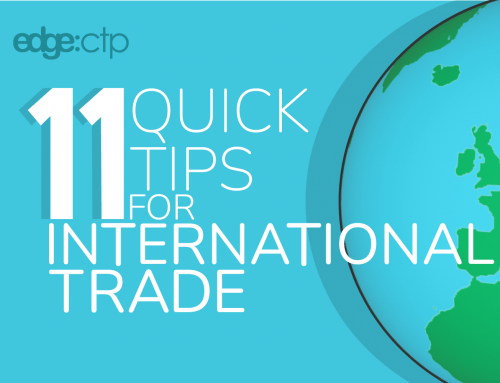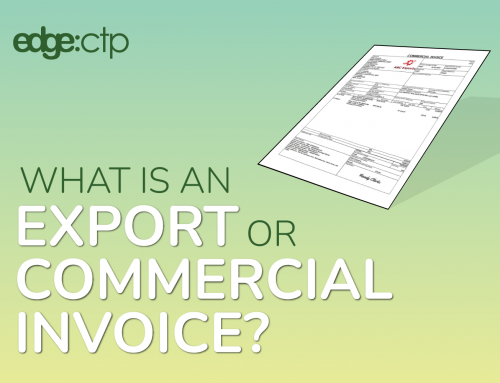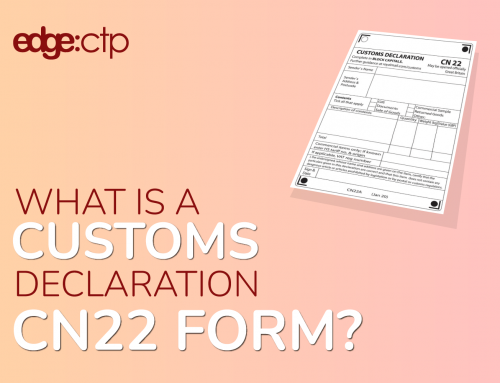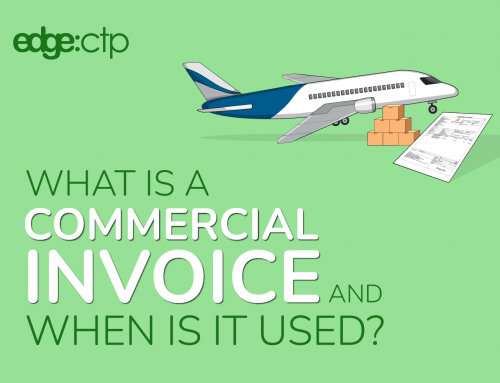How to Protect Against Non-Payment:
In international trading, the worry against non-payment is a primary concern for the seller/exporter and knowing how to protect against non-payment is something that can be simply by putting a few precautions in place at the very start.
Listen to how to protect yourself against non-payment.
Ask An Expert
Discussion with renowned global trade expert Murdo Beaton and Abdul Mann, creator of the cloud-based export solution EdgeCTP.
Geoff:
When trading globally, what is the best protection to put into place against non-payment?
Murdo:
Yes, getting paid. This is what it’s all about, isn’t it? This is what we’re in the business for, and if we cannot convert our product or service into cash then we have a big problem. In overseas markets, if we cannot get that cash repatriated to our bank account we have an even bigger problem. So it is massively, massively important to safeguard our financial interests in the form of payment for our product or service. To begin with, even BEFORE you agree to do the deal with the buyer, learn the following:
Creditworthiness of the buyer: Now we can, of course, in the first instance contribute to that safeguard by ensuring we are not placing our product or financial reward at risk by dealing with entities whose credibility might be questioned, or who are trading in an environment where cash flow could be a big problem for them, as my buyer, in terms of paying me. So I need to know about my buyer and how they behave in their sector.
Buyer’s business sector: Learn what’s their sector like, the sector that operates in your buyer’s domestic market? Is it a sector that is very poor at paying accounts, which might mean that my buyer from time to time might come under cash flow problems? This could interfere with my buyer’s ability to pay me. The same applies at the distributor level, not so much at the agent level but at the distributor level, it can also apply. So I need to make sure that the distribution channel that I have, be that a distributor or an end user, are not locations where I am over exposing the financial interests of my business.
Now having said that we then look at what instrumentation can we put into place to improve the security of our payment?
Payment Protection Measure 1: Get paid upfront. We could always say we’re not going to give any credit at all. We actually want payment upfront, which is the ideal position and one that I would always invite exporters to attempt at the very start. Not so easily achieved in a global market where competition is fierce and where the offering of credit is in actual fact slowly becoming the norm. However, if you don’t ask, you don’t get, so ask for full settlement upfront, and see what the buyer says. In this way, you are putting the creditworthiness checking on the buyer to perform on you, and that’s a far safer position to be in from the start.
Payment Protection Measure 2: Use credit instruments via trusted 3rd parties (e.g. Banks or other financial institutions). When offering credit to overseas buyers, we have financial instruments that we can use that gives us some additional protection:
- LC: Where the importer’s (your buyer’s) bank provides you with a document called a “Documentary Letter of Credit” (LC or DC for Documentary Credit), which means the buyer’s bank guarantees the creditworthiness of the buyer and underwrites the amount of the trade, so in the event the buyer does NOT pay, then the bank will
- Bills of Exchange or Banker’s Draft (whether negotiable or non-negotiable) is like a cheque drawn out by the buyer’s bank (3rd party drawer) and made out to you (the exporter or payee) for payment demand on a particular date from your buyer (the drawee). A Bill of Exchange is as good as cash in the bank, however, they aren’t used very much in international trade today, because of digital transfer of funds via banks
- Promissory Notes are like an I-owe-you (IOU) note from the buyer to the seller (you) for payment in the future, i.e. contractual obligation to pay. It works very much like a Bill of Exchange, however, it is NOT bank-related, so it isn’t as secure in some cases. Think of Promissory Notes as a loan agreement from you to your buyer, and it should have conditions set-out in it for non-or-late payments
These sorts of financial instruments can, in fact, enhance the security of our monies, but it is down to us at the end of the day to actually administer the cash management of our business. We should only give credit to entities where we feel all of the required disciplines have been put in place to safeguard our money.
Now I know it is tempting when huge levels of business/monies are being offered, that a seller/exporter may choose to actually jump on the side of recklessness at times, however, such behavior comes with massive health warnings, so be safe, go slowly and research the credit risk of your buyer, your buyer’s country; market sector and currency in which payment will be received (i.e. risk of the currency exchange rate moving significantly against your home currency or your buyer’s currency being devalued, etc.).
Abdul:
So trust is the key factor to establish right?
Murdo:
Correct. I would very much suggest to a business leader that when it comes to safeguarding your money abroad, you can never do enough research in terms of putting in place measure protections against being paid.
Abdul:
For letters of credit from banks, I guess, the banks will charge for that service.
Murdo:
Yes, banks charge for letters of credit service.
Abdul:
Do they charge that on a percentage of the trade value or just charge it as a flat fee, generally?
Murdo:
In some cases it’s a flat fee, in other instances it’s sometimes a small percentage of the value. Now it’s up to each individual business to actually negotiate their own position with their bank, but again, in order to be able to negotiate the best position, it’s imperative that the business leader knows almost as much about these financial issues as the bank does.
So, unless you really trust your bank to an absolute extent where you can actively say “I don’t need to know about these things because my bank will always guide me in the right direction.” If that’s the philosophy that you have, then fair enough, if you’re confident in that philosophy. However, my advice would be to teach yourself about all these things and then go and talk to your bank.
Payment Protection Measure 3: Not used very often, but helpful, is to get government agencies involved with the deal (such as Scottish Enterprise, DIT etc.) all of whom offer you assistance in understanding and introducing 3rd parties to help with protecting you against non=payment. Letting your buyer know that your local government agencies are also aware of the deal and credit obligations, usually mean the buyer is less likely to default.
Abdul:
This also kind of touches on the Trade Finance piece in some ways. Would that have anything to do with some of the government agencies that provide a trade finance route so that you can finance the trade?
Murdo:
Yes of course!
Abdul:
But does that actually give you protection, or does that just kind of give you the financial….? I’m talking about Invoice Financing or Invoice Factoring, where a lender (bank or financial consortium or broker) will pay you for the invoice (amount outstanding) you’d presented to the buyer i.e. the finance company will take on the debt so to speak and you get the money right away. Does that remove your risk from getting paid?
Murdo:
It just actually a mechanism for getting cash upfront to do the business/trade. That is, without the cash, you couldn’t provide the goods or services to the buyer, so rather than get a loan from a bank, you sell the debt for the cash now, giving you the funds to provide the goods and services to the buyer.
Invoice Financing, factoring or trade finance does NOT remove the need for the financial discipline that I’ve been speaking about earlier. It is still your responsibility to do that because the Trade Finance companies (or banks or government institutions) will NOT lend you the monies unless the buyer is creditworthy.
Abdul:
This means whether you are trading internationally or nationally, the level of due diligence you need to perform on your buyer, to prevent not getting paid, is just as important and the same.
Murdo:
Absolutely, saying: “Oh well, this is totally different from the domestic market.”, it’s simply not correct! I mean, the same risk applies in the domestic market, and there are hundreds and thousands of companies who will vouch for the fact that a domestic market is not as wholly credible as we might like to think it is.
Abdul:
There are rouge traders everywhere (laughs).
Murdo:
(Laughs) There are rogue traders everywhere. So we cannot just sit back and say “Oh, this is so different.” In actual fact, these financial disciplines that the overseas market might actually impact on a business, will do the business good in the domestic market because it’ll show them, these are things we could be doing with our own domestic customers. Gaining an even further competitive advantage.
I have often said this. Where in actual fact, companies have negotiated a financial position for their exporting activities with certain elements in it, which could be used in the domestic market, but hadn’t been used because in the past there hadn’t appeared to be a need for it. But in using them in the domestic market it actually gives a competitive advantage, which can translate itself into increased profitability in the domestic market. So, yes, your domestic market can learn from your overseas market experiences.
Abdul:
Which comes back to what we said earlier. In terms of going global, you need to have some systems and processes in place, which work for both your domestic and international market, such as we built into our online tool edgectp that supports your national and international trading processes.
Payment Protection Measure 4: Murdo, in the digital world of today and at the dawn of Smart Contracts leveraging on the Blockchain technology, we have a fourth way to protect ourselves against non-payment. We could encapsulate the delivery and payment terms onto the Blockchain and coupling it with a Smart Contract, which is actually a program that triggers actions to take place once pre-defined conditions are met. For example, goods have arrived with the buyer (tracked by RFID chips to a pre-agreed global location verified by GPS signals), in which case the Smart Contract transfers automatically the monies from the buyer’s “escrow account” into the seller’s business account. In fact, they could transact this in programmed and immutable cryptocurrencies, removing banking and exchange rate risks, and having a truly global currency.
Murdo:
Hmm… such advances in technology is interesting, but I would caution against their wholesale adoption at this early stage. It’s probably better to wait and see, and let others more pioneering in business than you, to pave the tried and tested path to using these technologies.
Geoff:
I hope you enjoyed this. If you’d like more information on international trade, go to www.edgectp.com.






